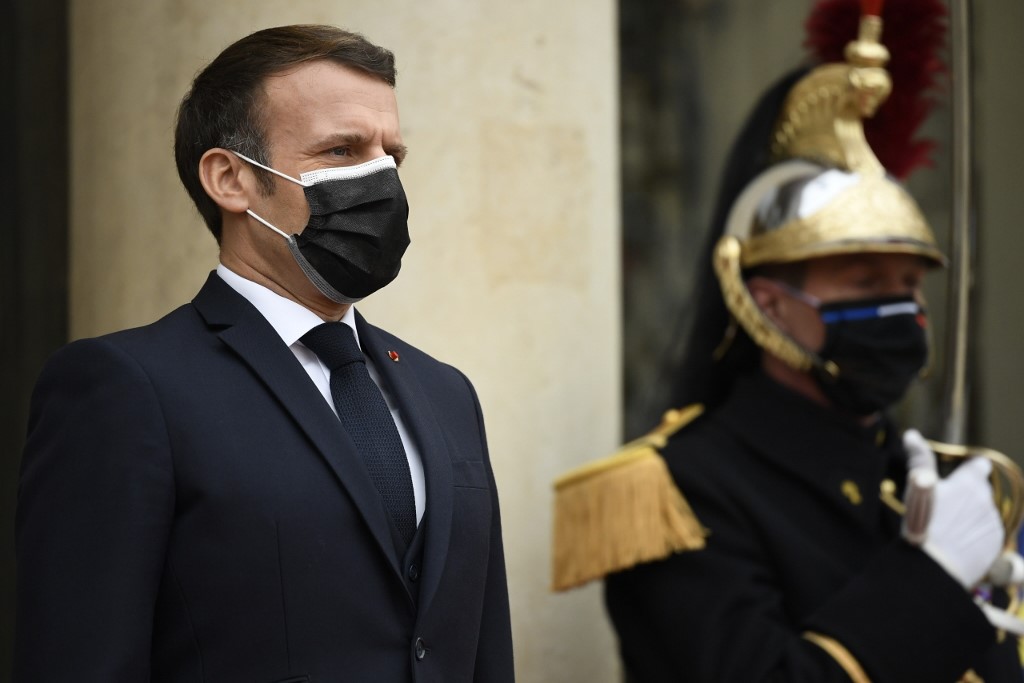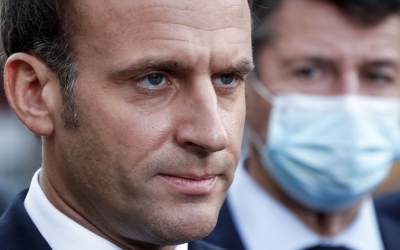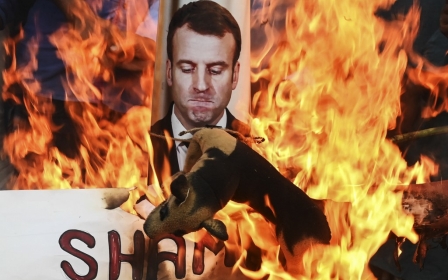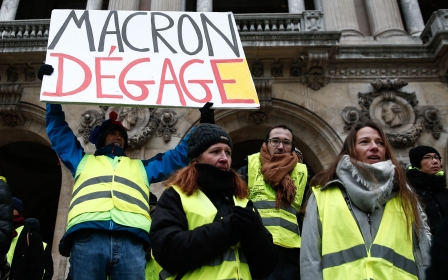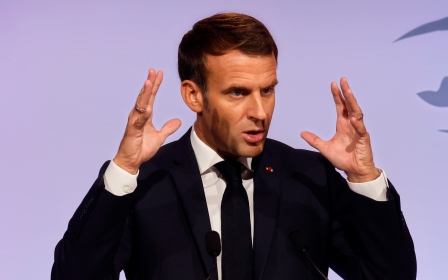Macron's version of 'French Islam' is state coercion against Muslims
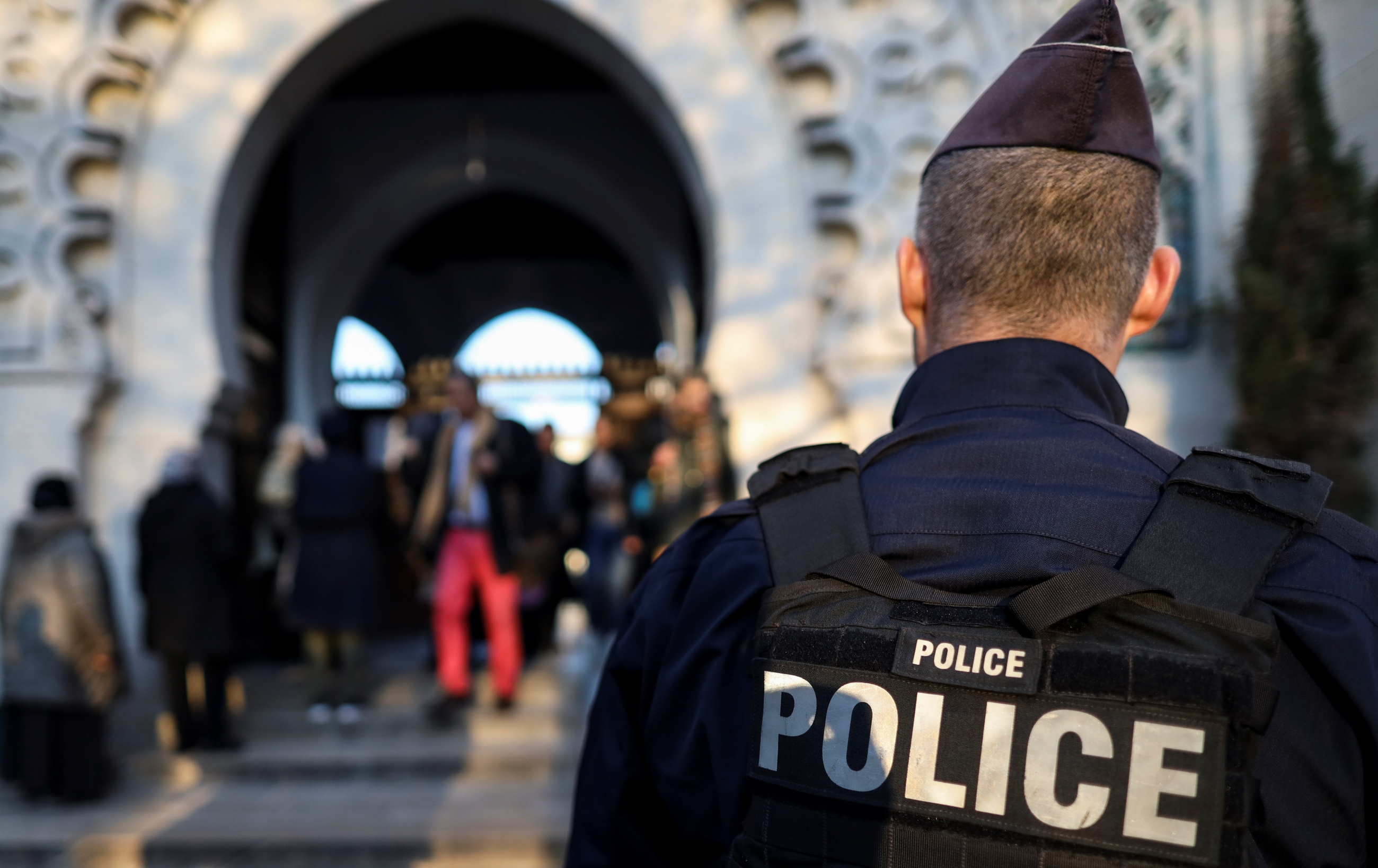
Last month, French President Emmanuel Macron announced a “historic” initiative: the creation of a formal council of imams to officialise the status of religious prayer leaders. The French secular state, which has justified its policing of virtually all public manifestations of Muslim identity in the name of laicite, is creating an official registry of Muslim imams.
The French Council of the Muslim Faith (CFCM), alongside the interior ministry, will establish the legal parameters for the faith practices of around five million Muslims in France.
Imams will have to sign a “charter of republican values”, with at least two red lines: political Islam and “foreign interference”. Gone will be the foreign funding that has hitherto, with approval from the French government, provided the means to finance mosques and their staff, in favour of a new model: a French Islam.
If the president truly wanted to foster a 'French Islam' might it not be necessary to engage French Muslims, rather than alienate them by treating their religious organisations as a security risk?
Macron is hoping to succeed where his predecessors have failed in bringing to life this political fantasy - a version of Islam that is politically docile and socially compliant. It would be an Islam without teeth, which could assimilate its impoverished adherents into a republic that systematically denigrates their religious identity, with two-thirds of French Muslims saying their faith is negatively perceived.
The registry of imams is part of a wider push by Macron to counter “Islamist separatism”. But why would a “French Islam” be any more malleable than other forms? Islam isn’t a centralised faith that can be controlled by a single leader’s approbation, nor should one assume that the French revolutionary and dissenting tradition wouldn’t - and doesn’t - also infuse the local practice of Islam. Both French history and Islamic principles place a primacy on social justice.
New MEE newsletter: Jerusalem Dispatch
Sign up to get the latest insights and analysis on Israel-Palestine, alongside Turkey Unpacked and other MEE newsletters
There is more than a little irony in this recent proposal. Imams are prayer leaders, while Islamic theologians provide the moral substance of the faith, and there are no plans to “officialise” them.
What’s more, the CFCM itself is itself made up of federations that receive foreign funding, and although it was created by former President Nicolas Sarkozy in 2003 to act as an intermediary between France’s Muslim communities and the government, it has struggled with questions of legitimacy.
Of around 2,500 mosques in France, 1,100 did not vote in the CFCM’s most recent elections - and regardless of Macron’s push to exercise control over this sphere, Muslims who wish to seek religious guidance outside of its parameters will be fully able to do so.
Performative spectacle
As French imam Tareq Oubrou points out, the federations that make up the CFCM are secular organisations, not theological ones; what do they know about training imams in theology? Worse still, what version of Islam are they set to “officialise”? Would it be the one imparted to them by the autocratic foreign governments that fund them? What kind of French Islam would that be?
Will we see a repeat of former President Francois Hollande’s 2015 initiative, when he sent French imams for training in Morocco to bring “French Islam” back home? Much of this spectacle appears performative, designed to reassure the electorate that Macron has the problem under control. But what exactly has he identified as the problem?
If the president truly wanted to foster a “French Islam” - something many French Muslims would no doubt welcome - might it not be necessary to engage French Muslims, rather than alienate them by treating their religious organisations as a security risk?
The notion of a French republic under ideological assault from a violent Muslim minority is a far-right fantasy, and yet Macron has capitulated to this vision. The clash of civilisations myth, long peddled by the National Front, now becomes policy through its appropriation by “liberals” vying for votes.
The theory of “Islamist separatism” is reminiscent of a deeply flawed neoconservative counterterrorism policy floated in the UK back in 2010. The “conveyor belt” theory pointed to ideology as the “main precursor to violent extremism”. A leaked cabinet committee memo at the time debunked this theory, saying it gave “undue weight to ideological factors” - and yet, not only has the theory been enshrined in the UK’s deeply contested Prevent strategy, but a French variant of this flawed thesis appears to underpin Macron’s latest bill on Islamist separatism.
'Apology for terrorism'
One of the more concerning aspects of the bill, which aims to free Islam in France from “foreign influences”, is that individuals convicted of “apology for terrorism” would be automatically added to a terrorism watch list. Given that hundreds of people, including children as young as 10, have been investigated for “apology for terrorism”, the bill risks criminalising a generation of Muslims whose expressions of opposition, or even benign acts of teenage rebellion - such as refusing to remove a hat and headphones during a minute of silence - could have life-changing implications.
Are we to believe that this will lessen resentment towards the state and improve security?
Institutions of French civil society, from mosques to sporting organisations, would also, according to the bill, come under stricter government control, with local authorities given greater freedom to close them on the basis of the actions of one of their adherents, regardless of whether they hold a position of authority within the association’s structures.
The government is already dissolving civil society organisations by decree, including a prominent Muslim charity, BarakaCity, and the Collective Against Islamophobia, a prominent human rights group that Interior Minister Gerald Darmanin described as an “enemy of the republic”. It has done so without any evidence of illegal behaviour, sending a stark warning to French Muslims seeking to assert their rights. Amnesty International denounced the closures as “undermining freedoms of expression and of association”.
Pillar of French identity
The French constitutional principle of laicite imposes a strict religious neutrality on both the state and public services, and represents a pillar of French identity. Yet this new bill proposes to modify this historic pillar, changing it from a form of legal protection from the state, to a form of political coercion.
France undoubtedly faces a threat from terrorism, but the current measures risk putting the very foundations of the republic at risk, while officialising a latent hostility towards Muslims. Macron’s legacy could be enshrining this in law.
The views expressed in this article belong to the author and do not necessarily reflect the editorial policy of Middle East Eye.
Middle East Eye delivers independent and unrivalled coverage and analysis of the Middle East, North Africa and beyond. To learn more about republishing this content and the associated fees, please fill out this form. More about MEE can be found here.



